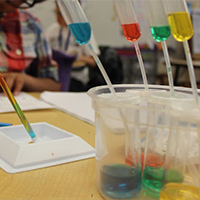The Power of High Quality Science Instruction
By Chelsea Cochrane, Science Coordinator at San Diego County Office of Education
chelsea.cochrane@sdcoe.net
In 2019, there was a huge buzz about science education in California and how the CAST could be a catalyst for change as it became operational and the first year of data was collected. We knew great work was happening in schools across our county and the state as the implementation of NGSS was prioritized in many districts. Science educators were hopeful that these efforts would show in the quantitative data gathered through the administration of the CAST. Unfortunately, when the results were released, the statewide data was not great and the patterns of educational inequities we worked hard to dismantle were still present in the data. We continued to be hopeful that this first year of data would be the springboard to action and that science education would get the attention we have long advocated for. Then, COVID-19 changed our lives. As we continued to live through a global pandemic, the state put a pause on our statewide science testing efforts. Now that schools are reopened and students are reengaging with science learning, we are shining a light on a story that did not get told when it should have.
As we looked at state, county, district, and school CAST data for success stories, we found the highlight was right in our own county with a school that was on the NGSS journey with us since our first Elementary Science Academy professional learning cohort. Looking for examples of small-scale success brought us to Wolf Canyon Elementary School in the Chula Vista Elementary School District. The 5th-grade CAST data at Wolf Canyon showed amazing results compared to the district, county, and state-level data. The 5th grade was led by Marlys Williamson, one of our NGSS in Action video series feature educators. She was joined by fellow 5th grade educators Jason Cross and Erin Marmion. The 5th-grade team focused their year on science, each starting the year using curriculum from The Inquiry Project with their core students. During this opening unit, they focused on the discourse strategies and Talk Moves from the Inquiry Project and started having students use science notebooks. After the opening unit, they each focused on a science domain and their three classes rotated through each domain throughout the year. This approach allowed each of them to deeply understand one unit and teach it three times. They used the FOSS Next Gen Mixtures and Solutions module for the physical science rotation, developed an Earth and space science unit using NASA’s Sun as a Star as a foundation, and created a life science unit based on the instructional design of FOSS and The Inquiry Project. Each unit continued to focus on students’ use and development of language and literacy skills through hands-on inquiry science using science discussions and science notebooks. This approach saw students enthusiastically engage in science learning. Students' growth in their ability to think and reason scientifically was evident in the change in student notebooks from the beginning of the year to the end.

in their science notebooks
Photo source: Chelsea Cochrane
The CAST data supported what was evident when walking into classrooms — Wolf Canyon 5th-graders knew their stuff! At Wolf Canyon, 62% of 5th-grade students Met or Exceeded Standards as measured by the CAST in 2019, compared to 38% districtwide and only 30% statewide. The most impactful data was the performance of Wolf Canyon’s English learner population. In the 5th grade class, 42% of students identified as English learners Met or Exceeded Standards, compared to just 6.8% in the district, and only 2.9% in the state. At Wolf Canyon, the remaining 58% of English learners scored in the Nearly Met category, meaning there was not one student who is an English learner that scored in the Standard Not Met category. For comparison, in the state, 46% of 5th-graders identified as English learners scored Standard Not Met.
In addition to working on their own skills and improving their ability to provide quality instruction that valued the cultural knowledge of their students, the Wolf Canyon 5th-grade teaching team held the mindset that each and every student was capable of learning science. When we believe in the brilliance of all kids, amazing things happen.






